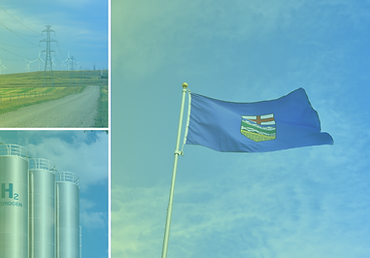
Alberta's Future Competitiveness
Current Initiative
Seizing low-carbon opportunities starts with Alberta’s regional strengths

Overview
Alberta has an emerging portfolio of low-emission, resource-based sectors with immense potential for growth. Diversifying into these sectors can strengthen regional economies, attract investment, and unlock new export opportunities. Alberta can lean into its advantages to compete where demand is rising, but seizing these opportunities means understanding which opportunities will work, and where — what works for Grand Prairie may not work in Lethbridge and vice versa.
Looking at these opportunities through multiple lenses can reveal where they make the most sense and where we can turn local strengths into global advantage. Actioning these can help build a resilient, competitive economy for all Albertans.
Why It Matters
The Challenge
Alberta has much of what the world needs — its natural resources, established industrial base, and track record in both energy innovation and industrial decarbonization position it well to compete in an ever evolving global economy. For decades, Alberta’s prosperity has been powered by energy exports, and in this new era of energy co-existence Alberta is a growing supplier of both traditional energy and clean technologies. Staying competitive will mean looking beyond traditional sectors and leaning into where demand is growing.
The province has a window to shift the playbook and align with where global value chains are heading; diversifying into low-carbon sectors can reduce exposure to geopolitical turbulence while finding opportunities across broader economic zones. With global investment in low-carbon energy expected to reach over $3 trillion, countries are moving fast to secure their share. Alberta’s next moves can help or hinder its position in this shifting global energy landscape.

Our Approach
We mapped where Alberta can compete in emerging sectors by evaluating regional fit, feasibility, and future markets for 16 low-carbon, resource-based opportunities. Our work surfaced what’s needed to build agility and resilience for a diversified economy, and highlights three levers for success:
-
Understand and meet global demand for low-carbon supply chains
-
Scale up technologies and the service ecosystems around them
-
Secure market share in sectors with high growth potential
We embarked on a study to help assess opportunities through multiple lenses, and offering pathways to evaluate and prioritize them. It highlights the emerging industries, technologies, and opportunities that make economic sense irrespective of their emissions profile.
View the report: Alberta's Future Competitiveness and the Next Wave of Growth
But beyond the numbers and rankings, the success of these opportunities hinges on support from the regions where they make the most sense. Recognizing that top-down solutions rarely work, we’re engaging partners across Alberta’s diverse regions to explore where opportunities fit, what can accelerate them, and how they can bolster economic diversification.
Studying the Opportunities
The project began with a comprehensive review of existing research, examining comparative advantage and market potential for numerous low-emission opportunities for Alberta. It was guided by an outstanding Advisory Committee of some of Alberta’s leading experts on energy innovation, economic development, and sustainability.
The study insights were deepened through expert interviews, engagement with Alberta's regional innovation networks, community coalitions, and consultations with municipal leaders and with policymakers.
The Lab has a strong record of supporting emerging ecosystems, having contributed to the impact and growth of a number of industries in the past decade. By leveraging the Lab’s convening power and innovative processes, we’re now engaging provincial and regional ecosystem leaders, aiming to dismantle barriers and turn opportunities into action.
A Phased Approach
Phase 1 – Research
-
A deep dive into 16 sectors with significant economic potential
-
Offering multiple “lenses” to assess competitiveness and feasibility
Phase 2 – Validation and Regional Prototyping
-
Test findings with industry experts, innovation networks, communities, and policymakers
-
Identify enabling conditions for investment and project success
Phase 3 – Regional Engagement & Roadmapping
-
Work with communities and ecosystem partners to explore which opportunities fit locally
-
Co-create strategic initiatives to advance regional economic competitiveness

Shaping Energy Future Competitiveness in Southern Alberta
In partnership with the Energy Futures Lab, the Town and M.D. of Pincher Creek and the Southern Alberta Sustainable Community Initiative (SASCI) came together to position Southern Alberta for success in emerging market opportunities.
Through a series of professionally facilitated sessions, regional leaders and community representatives explored how to leverage low-carbon opportunities to aid competitiveness and deliver local benefits. Together, participants co-created a set of strategic initiatives and actionable opportunities to advance Southern Alberta’s economic future in a way that works for the region and its people.
Updates & Resources
For more information or to get involved, contact:
Keren Perla
Project Director, Alberta’s Clean Competitiveness
kperla@energyfutureslab.com
Join Us
Be part of shaping Canada's energy future —sign up for the latest insights and opportunities from the Lab




